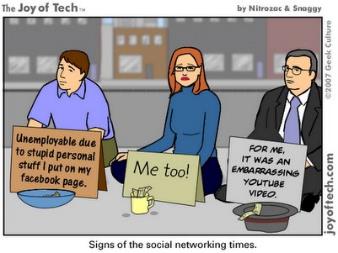Your Digital Footprint & Your Employer/ Placement Provider [2]
Your employer will not want their reputation tarnished by the "inappropriate" behaviour of its employees or students online, even outside working hours.
Sixty percent of US employers admitted to using social networking sites to research job candidates in 2016, up from 52 percent in 2015 and 11 percent in 2006 .
More than a quarter of employers have found content online that has caused them to reprimand or fire an employee.
 49% of US employers poled in 2016 admitted that they have rejected a candidate because of what they saw about them on a social networking site.
49% of US employers poled in 2016 admitted that they have rejected a candidate because of what they saw about them on a social networking site.
- For reasons including Provocative or inappropriate photographs, videos or information - 46 percent
- Information about candidate drinking or using drugs - 43 percent
- Discriminatory comments related to race, religion, gender, etc. - 33 percent
- Candidate bad-mouthed previous company or fellow employee - 31 percent
- Poor communication skills - 29 percent
About one-third of employers who screen candidates via social networks (32 percent), however, found information that caused them to hire a candidate, including:
- Candidate's background information supported job qualifications - 44 percent
- Candidate's site conveyed a professional image - 44 percent
- Candidate's personality came across as a good fit with company culture - 43 percent
- Candidate was well-rounded, showed a wide range of interests - 40 percent
- Candidate had great communication skills - 36 percent
Tone and content
![C:\Users\Amandeep Cheema\Documents\SoM\digital-professionalism\LATEST\Module1Photos\Your Digital Footprint & Your Employer Placement Provider [1].jpg](images/pic014.png) It is not a good idea to vent about an employer, colleague or client on social media. Your colleagues may interpret references made to them in your blog or status lines on social media as unsettling, defamatory, libellous or bullying so be mindful of the sensitivities of others who may feel uncomfortable about the prospect of being discussed online.
It is not a good idea to vent about an employer, colleague or client on social media. Your colleagues may interpret references made to them in your blog or status lines on social media as unsettling, defamatory, libellous or bullying so be mindful of the sensitivities of others who may feel uncomfortable about the prospect of being discussed online.
Potential employers may conclude that a predominantly negative tone or even negative comments made by students about their university, placement or current employer reflects worse on the individual who made them than on the person about whom they are made. It is far more constructive to raise any issues you may have directly with the institution, the people concerned via conventional whistle blowing channels, instead of letting off steam by publishing gripes in the public domain, whether founded or not.
Institutional/Organisational policy
Social media may indeed be the ideal forum to influence policy and plans if already being debated in the public domain.
Many employers, from Apple to financial institutions such as banks and hedge funds, to NHS trusts and humanitarian agencies, have policies that prohibit any mention of the employees' location on external commercial social networking platforms in an effort to ensure the confidentiality for the clients, protecting the brand of their organisation and safeguarding industrial secrets, so familiarise yourself with policy and walk with awareness. It may be that you need to think carefully about allowing Snapchat to publish your exact location, or even that you are required to disable location services on your smartphone when you are travelling with work. Be clear about the specific workplace policy and the law and be seen to play nicely!
The Internet and social media specifically, is closely monitored by journalists who are constantly on the lookout for stories.
Consent for photographs
When taking photographs of clients, always check what your department / employer's policy is with regards to consent and confidentiality.
 You must never take clinical photographs of patients' conditions with a mobile phone or tablet computer, even with the consent of the patient. Many NHS trusts have policies forbidding this practice in order to ensure patient confidentiality. Metadata embedded in the images can give up patient confidentiality and further, they can readily be streamed to the notoriously leaky Apple iCloud, to other devices or to social networks. Clinical images form part of the patients' notes and are patient, their storage is governed by specific information governance policies, requiring specific levels of encryption and European hosting. WhatsApp specifically should NEVER be used for clinical communications - it has been expressly forbidden for use by the NHS. Images shared via WhatsApp, are usually downloaded to Smartphone photo albums by default, and streamed between all networked devices.
You must never take clinical photographs of patients' conditions with a mobile phone or tablet computer, even with the consent of the patient. Many NHS trusts have policies forbidding this practice in order to ensure patient confidentiality. Metadata embedded in the images can give up patient confidentiality and further, they can readily be streamed to the notoriously leaky Apple iCloud, to other devices or to social networks. Clinical images form part of the patients' notes and are patient, their storage is governed by specific information governance policies, requiring specific levels of encryption and European hosting. WhatsApp specifically should NEVER be used for clinical communications - it has been expressly forbidden for use by the NHS. Images shared via WhatsApp, are usually downloaded to Smartphone photo albums by default, and streamed between all networked devices.
Even on elective, in foreign countries, it is essential to work within the local policy and guidelines. Some clinical interventions abroad, particularly on minors, may be perceived as images of child mutilation or abuse in this country and could result in prosecution, even if uploaded to your elective blog when abroad. Be sure to seek and keep a record of all policies and consents for photographs if taken abroad.
![C:\Users\Amandeep Cheema\Documents\SoM\digital-professionalism\LATEST\Module1Photos\Your Digital Footprint & Your Employer Placement Provider [2].jpg](images/pic016.png) Social and Digital Media - your distinct advantage!
Social and Digital Media - your distinct advantage!
Companies are increasingly using social media and digital profiles for recruitment purposes. Develop your online presence and technical insight as an employability asset and use it to give an authentic positive impression of you, your unique voice and competency at expressing yourself on social channels, your intellectual acumen, exploring opinions, engaging in dialogue, developing yourself intellectually and networking in the public domain. There are far too many cases in the press, of people losing their jobs over poor internet and digital media use. Give yourself a valuable edge and a distinct advantage!